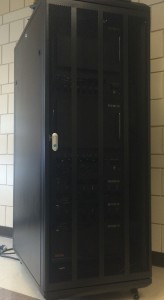 The Novonix High Precision Charger (HPC) is the state-of-the-art system for non-destructively diagnosing the degradation mechanism of Li-ion cells and predicting the lifetime of the cells. The system can measure the coulombic efficiency (ratio of discharge to charge capacity) of a Li-ion battery more accurately than any commercially available chargers. The HPC was originally built by Prof. Jeff Dahn’s group at the Dalhousie University in Canada, and has a wide variety of applications in battery design, reliability testing, and life-cycle analysis.
The Novonix High Precision Charger (HPC) is the state-of-the-art system for non-destructively diagnosing the degradation mechanism of Li-ion cells and predicting the lifetime of the cells. The system can measure the coulombic efficiency (ratio of discharge to charge capacity) of a Li-ion battery more accurately than any commercially available chargers. The HPC was originally built by Prof. Jeff Dahn’s group at the Dalhousie University in Canada, and has a wide variety of applications in battery design, reliability testing, and life-cycle analysis.
The HPC system in the SRSL is currently being used to support multiple research projects related to the reliability and safety of Li-ion battery, and is part of the Advanced Battery Failure Diagnostics research capacity that is being developed at the SRSL. Examples of these projects are listed as follows:
- Long-term performance prediction of new battery chemistries and designs through short-term measurement of coulombic efficiency, which this allows lifetime estimates to be made in a short term (e.g., a few weeks);
- Differential voltage (dV/dQ) and differential capacity (dQ/dV) analyses for identification of degradation mechanisms and prediction of lifetime, and the integration of these analyses with Battery Management Systems (BMSs) for improving the operational reliability and safety of Li-ion cells under varying operating conditions;
Non-intrusive detection of critical failure modes such as the onset of lithium plating, which allows the identification of voltage and current thresholds of when lithium plating occurs for a specific cell design, and the optimization of the charging rate at a given temperature without degrading the cell capacity.